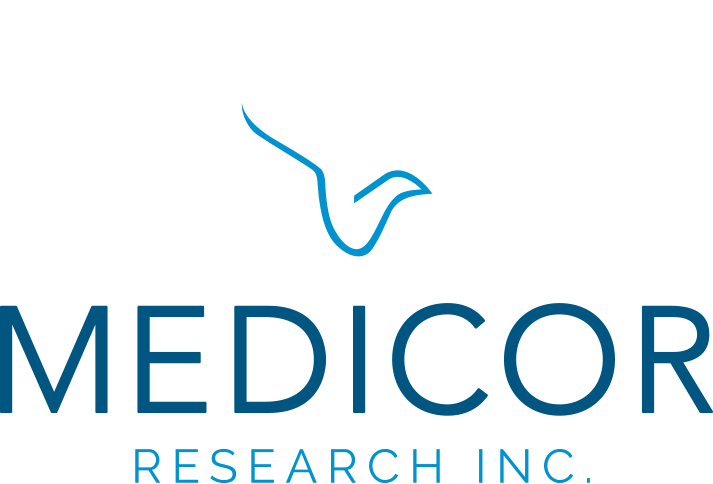
Frequently asked questions
How do I find out about research studies?
- Your doctor, nurse or pharmacist may refer you to Medicor for a study he thinks would benefit you and his research coordinator calls you to give you information about the study
- Certain Medicor studies are advertised in the newspaper, television, posters and pamphlets in the Doctor’s office or through public information events in local malls and associations
- Medicor may contact you directly if you have previously agreed to be entered in their database
How can I find out if I can join a research study?
- Research studies are designed to study patients who meet specific criteria. The best way to find out if you qualify is to first speak to the research coordinator who will ask you certain screening questions related to the type of patients required for the study. If you meet the basic requirements the research coordinator will book you for an informed consent visit and screening visit.
Do I get paid to join a research study?
- You are given a stipend in order to ensure your participation is cost neutral, so the stipend covers costs for transportation, parking, childcare if required, etc.
What can I expect at an informed consent visit and screening visit?
- At the informed consent visit the research coordinator will explain the study to you and give you an informed consent form (ICF) to read.
- After you finish reading the ICF the research coordinator will review each page of the form with you and answer any questions you may have.
- If you need additional time to consider participating we encourage you to discuss the study with others such as family, a friend, or your family doctor.
- If you decide to participate after receiving all the information about the study and having your questions answered the research coordinator will have you sign and date the ICF and give you a signed photocopy to take home with you.
- The screening visit may be done directly after you sign the ICF or you may need to be booked for a separate screening visit depending upon the study. For example you may need to be fasting or even hold off on taking medication before your screening visit. Your research coordinator will give you instructions to follow as required.
- At the screening visit the research coordinator will take a medical and medication history, you may need to give a sample of blood or urine, other tests may be performed such as vital signs or an electrocardiogram. You will see the study doctor and he will examine you to make sure the study is a good fit for you, that it is safe for you to participate, and that you meet the criteria of the study.
What is expected of me if I join a research study?
- You will need to attend a set amount of study visits with the research coordinator and the doctor.
- If the study involves an investigational medicine you will need to take it as directed and return all unused medicine and packaging to the research coordinator.
- Some studies have certain assessments for you to do at the visit or at home, for example: there might be a diary card to fill out, you may be asked to take your blood pressure on an automated machine, etc
- At each visits your research coordinator will ask you about any medical visits you’ve attended or if you had changes to your regular medications.
- Depending upon the type of study you may be sent for diagnostic tests such as a chest x-ray or CT scan.
Do I have to stop taking my regular medication?
- Each research study is unique; some investigational medicines are taken with your regular medicine and some are taken in replace of your regular medicine.
Are there placebo or sugar pills used in research studies
- Some studies are what is called placebo controlled. This means that you have a chance to receive active medication or a placebo pill. Studies are designed with patient safety in the forefront so if the patient isn’t safe taking a placebo, the study will not be allowed to use a placebo.
How do I know if I’m taking active medicine or placebo?
- Most studies are designed to hide which treatment you are given from you, the doctor, the sponsor and the research coordinator. After the last patient has completed the last visit in the study and all the results have been analyzed the sponsor of the study releases the treatment information to the study doctor. You are notified when this information becomes available.
What if the study medicine is not working for me?
- Studies are designed to determine the effectiveness and safety of new medicines. If the medicine is not working for you the doctor can alter the dosage, prescribe an alternative medicine or stop the study medicine completely. Your safety is always the first priority.
Do I have to stay in the study?
- You are able to withdraw from the study at anytime. The research coordinator and study doctor are obligated to ask you the reason why you want to withdraw from the study. If you withdraw from the study you may be asked if you are willing to only withdraw from the study medication but still be followed for the study visits. It is also acceptable to completely withdraw from the study visits.
Will my family doctor be notified of my participation in the study?
- At the time of informed consent you will be asked if you want your family doctor to be notified. It is your choice to decline although it is preferred that we keep your family doctor informed of any changes to your health and medications.
Is my personal medical information protected?
- Upon enrollment in a study, each patient is assigned a unique study number. The study number is used to identify data rather than identifiable personal information. This facilitates the process of maintaining patient confidentiality.
How do I know the study is safe?
- Every research study in Canada using investigational medicines must first be approved by Health Canada. After Health Canada has approved a study it is reviewed and authorized by an independent ethics review board before any patient is seen. The ethics review board is independent of the study doctor and the study sponsor. The role of the independent ethics review boards is to protect patient rights and safety. The name and contact information of the independent ethics review board is contained in the ICF.
How can I make sure I am contacted for a research study?
- Register as a patient through the Medicor website and ask to be put into the Medicor database.
- Check the Medicor website often and call us if there is a study listed that you are interested in.




